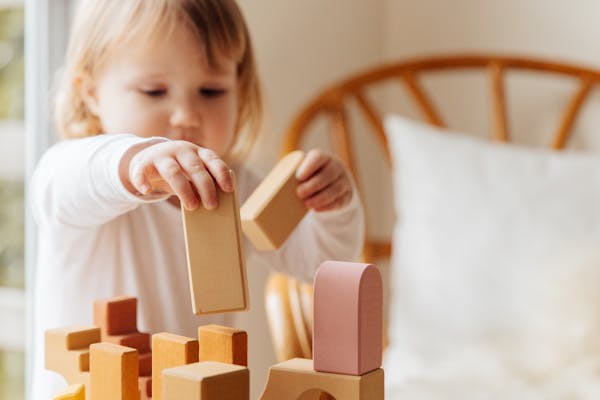As parents, we all want the best for our children, especially when it comes to their education. Early childhood education plays a crucial role in shaping a child's future by laying down the foundation for their academic and social development. But with so many options available, choosing the right program can be overwhelming. That's why we've put together this comprehensive guide that covers everything you need to know about early childhood education. From understanding developmental stages to selecting the perfect program for your child, we'll provide you with strategies for successfully navigating this important journey!
The Importance of Early Childhood Education
Early childhood education is a critical period of development for children, laying the foundation for their cognitive, emotional, and social growth. During this stage, children's brains are rapidly developing and forming neural connections that will shape their future learning capabilities.
Research has shown that children who receive high-quality early childhood education programs are more likely to succeed academically and socially in later years. These programs provide opportunities for children to develop language skills, build self-esteem and confidence, learn problem-solving skills, and establish positive relationships with peers.
Early childhood education also plays an essential role in closing the achievement gap between low-income students and their higher-income counterparts. By providing access to quality preschool programs to all children regardless of socio-economic background, we can ensure that every child has an equal chance at success.
In addition to academic benefits, early childhood education can have long-term positive effects on physical health outcomes as well. Studies show that individuals who received early intervention services tend to lead healthier lives overall than those who did not.
Investing in high-quality early childhood education is one of the best ways we can support our future generations' well-being while positively impacting society as a whole.
The Developmental Stages of Children
The first stage of development is the sensorimotor stage, which occurs from birth to two years old. During this period, children develop their senses and motor skills by exploring their environment through touch, taste, smell, sight and sound.
The second stage is the preoperational stage which happens between ages two to seven years old. Children in this phase begin to use language more effectively but still have limited logical thinking abilities.
In the concrete operational stage (ages 7-12), children start to think logically about concrete events but may struggle with abstract concepts.
During adolescence (ages 12-18), teenagers experience rapid growth physically and mentally while developing their identities.
Understanding each developmental phase can help parents adapt parenting styles that meet a child's needs at each specific age level. By providing opportunities for exploration of senses when young or allowing independence as teens navigate identity formation - we can aid our children's healthy development throughout life!
The Role of Parents in Early Childhood Education
Parents play a crucial role in their child's early childhood education. They are the first and most important teachers that children have, and they can greatly influence their child's development during this critical period.
One of the primary roles of parents is to provide a nurturing environment for their children. This means creating a safe space where children feel loved, supported, and encouraged to explore the world around them. Parents can do this by providing opportunities for play, reading together, and engaging in other activities that promote learning.
In addition to providing a nurturing environment, parents also need to be actively involved in their child's education. This involves working closely with teachers and caregivers to ensure that their child is reaching important developmental milestones and receiving appropriate support when needed.
Communication is key when it comes to parental involvement in early childhood education. Parents should regularly communicate with teachers about their child's progress and ask questions if they have any concerns or areas of confusion.
Parents should also model positive behaviors for their children. By demonstrating good habits like reading regularly or practicing healthy eating habits, parents can help instill these same values in their children from an early age.
The role of parents in early childhood education cannot be understated. Through love, support, communication, and modeling positive behavior patterns towards learning; parents play a vital part in the success of every young learner’s journey through life-long educational pursuits
The Different Types of Early Childhood Education Programs
One type of program is the Montessori approach, which emphasizes self-directed learning in a structured environment. Children work with specially designed materials to develop their cognitive, social, and physical skills.
Another option is play-based learning programs where children learn through play activities. These programs provide opportunities for exploration, creativity, communication and problem-solving skills.
Reggio Emilia Approach focuses on child-led projects that encourage collaboration among peers while emphasizing creativity and individuality. Teachers act as facilitators rather than instructors.
There are academic-focused preschools that aim to prepare children for kindergarten by teaching them basic literacy and numeracy skills at an early age.
It's important to research each program carefully before making a decision about your child's education. Every family has unique needs so it is essential to find the right fit for both you and your child!
Choosing the Right Early Childhood Education Program for Your Child
Choosing the Right Early Childhood Education Program for Your Child
As a parent, one of the most important decisions you'll make is choosing the right early childhood education program for your child. With so many options available, it can be overwhelming to know where to start.
The first step in choosing a program is understanding your child's unique needs and learning style. Some children thrive in structured environments with specific routines, while others prefer more flexibility and creativity. Consider what type of environment would best support your child's growth and development.
Once you've identified your child's needs, research potential programs thoroughly. Look for programs that align with your values and goals as a family. Check reviews from other parents or schedule visits to observe how teachers interact with students.
It's also important to consider practical factors such as location, cost, hours of operation, and availability of transportation or before/after school care.
Ultimately, trust your instincts when making this decision. You know your child better than anyone else and will likely have a gut feeling about which program is the best fit. Remember that no matter which program you choose, regular communication with educators will help ensure ongoing success for both you and your child.
Tips for Successfully Implementing Early Childhood Education Programs
Firstly, involve parents in the learning process of their child by providing them with information about the program goals and how they can support their child's development at home. Encourage open communication between parents and teachers to ensure that everyone is on the same page when it comes to educational expectations.
Secondly, create a positive classroom environment that fosters socialization among children. Children learn best when they feel safe and comfortable in their surroundings. Make sure there are enough materials for each child to actively participate in learning activities without feeling left out.
Thirdly, set achievable goals for every child so that they feel motivated to achieve success while avoiding any unnecessary pressure or stress. Provide regular feedback on progress as well as constructive criticism where necessary.
Keep up-to-date with current trends in early childhood education research and developments so you can continue refining your teaching techniques over time. Attend conferences or training sessions regularly and collaborate with other professionals who share similar interests in improving early childhood education standards.
By following these simple tips, educators can make significant strides towards creating effective early childhood education programs which have long-lasting benefits for young learners' academic careers ahead!
Why Is Early Childhood Education Important?
Conclusion
Early childhood education is crucial in preparing children for a successful future both academically and socially. By understanding the developmental stages of children, parents can select an appropriate early childhood program that caters to their child's needs.
Parents play a vital role in their child's early education by being involved, supportive and communicative with teachers. Choosing the right program can be daunting but parents should take into consideration factors such as teacher qualifications, curriculum, class size and environment.
Implementing effective strategies such as reading aloud daily, exposing children to music and art and allowing them to learn through play will enhance their learning experience. Creating a positive attitude towards learning at this stage will set them on the path for academic success.
Early childhood education programs aim to develop emotional maturity, social interaction skills and cognitive development in young learners. Therefore it is essential that parents are proactive in seeking out quality programs that meet these goals.
Investing time into your child's early education sets a solid foundation for their future academic achievements yet also contributes greatly to their personal growth. The value of Early Childhood Education cannot be understated – start investing today!




